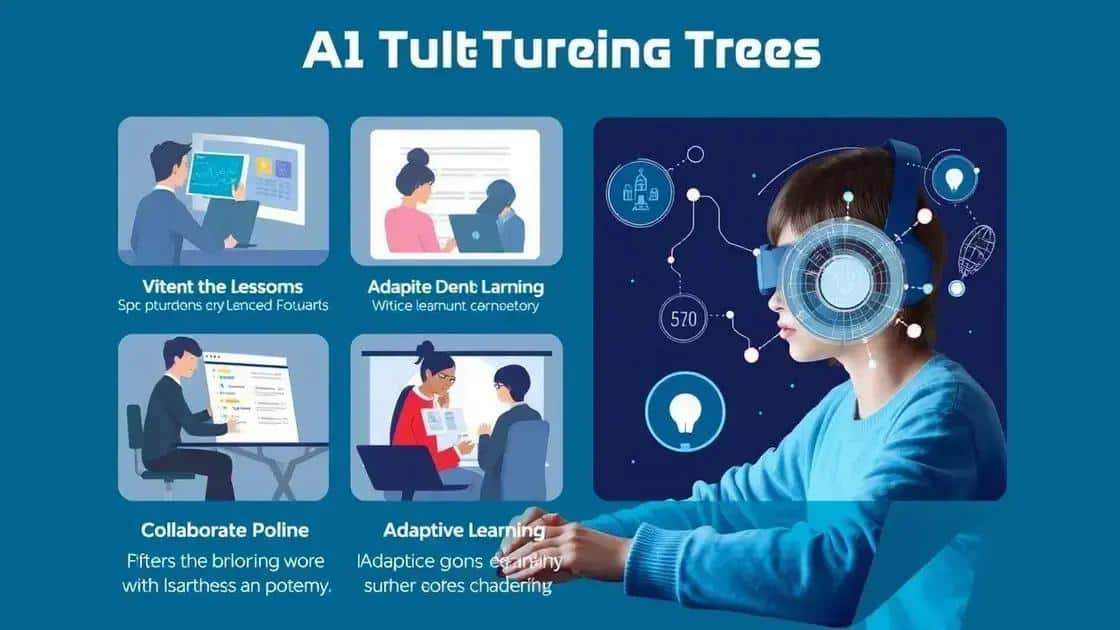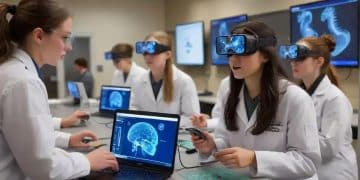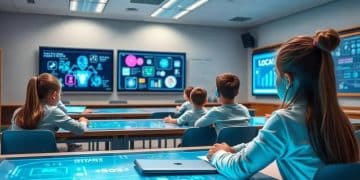AI tutoring programs trends shaping the future of education

AI tutoring programs revolutionize education by offering personalized learning experiences, real-time feedback, and innovative tools like virtual reality, addressing diverse student needs effectively.
AI tutoring programs trends are transforming the educational landscape, shaping how students learn and engage with content. Have you ever wondered how these advancements impact your own learning journey? In this article, we’ll delve into the latest trends and what they mean for the future of education.
Emerging technologies in AI tutoring
Emerging technologies in AI tutoring are revolutionizing education. With advancements in personalization and real-time feedback, students benefit from more engaging and tailored learning experiences. These technologies allow for better understanding and retention, ensuring learners progress at their own pace.
Key Technologies Driving AI Tutoring
Several innovative technologies contribute to the growth of AI tutoring. Among these, machine learning algorithms play a pivotal role in adapting lessons to individual needs. Another significant technology is natural language processing, enabling interactive dialogue between students and AI tutors.
- Adaptive learning systems that customize content based on performance.
- Chatbots providing instant support and answering questions.
- Virtual reality environments for immersive learning experiences.
As we explore these technologies, it’s clear they are not just enhancements, but essential tools in modern education. For instance, predictive analytics helps identify students who might need additional help, allowing timely interventions. This proactive approach enhances the learning journey for many students.
The Impact of Emerging Technologies
The impact of these technologies goes beyond just academic improvements. They foster a sense of independence in learners, empowering them to take charge of their studies. With personalized pathways, students can dive deeper into subjects that interest them, making learning not just effective but also enjoyable.
Moreover, instructors benefit significantly from the insights generated by AI tutoring systems. They gain valuable data on student performance, enabling them to refine teaching methods and provide targeted support. This collaboration between AI and educators creates a more robust learning environment, benefiting both parties.
In conclusion, the rise of AI tutoring through emerging technologies marks a significant shift in how education is delivered. It opens doors to personalized learning experiences that cater to the unique needs of each student, making education accessible and effective.
Benefits of AI tutoring programs

The benefits of AI tutoring programs are significant and wide-ranging, impacting students, educators, and the overall learning environment. One of the primary advantages is personalized learning. These programs adapt to each student’s unique needs, allowing them to progress at their own pace. This customized approach helps address individual learning gaps effectively.
Enhanced Learning Experiences
Another benefit is the ability to provide real-time feedback. With AI tutoring programs, students receive immediate insights on their performance, helping them understand concepts better and correct mistakes on the spot. This timely feedback can significantly enhance the learning process.
- Students gain confidence through immediate reinforcement and support.
- Learning is more engaging with interactive tools and resources.
- Tutoring programs can track progress over time, providing valuable data for both students and teachers.
Moreover, AI tutoring programs promote a sense of independence among students. They encourage learners to take charge of their education, fostering self-motivation and exploration. This aspect is particularly crucial as students prepare for future academic and professional challenges. By learning to rely on AI tools, they develop skills that will serve them beyond the classroom.
Support for Educators
Additionally, these programs support educators by alleviating some of their workload. Teachers can focus on more complex teaching tasks and provide support where it’s most needed. With AI tutoring programs, they receive data-driven insights that help identify which students may require extra assistance, allowing for more targeted interventions.
In essence, the integration of AI tutoring programs into education enhances both the teaching and learning experiences. By providing personalized pathways, real-time feedback, and valuable data, they create a more effective learning environment for everyone involved.
Challenges faced by AI tutoring platforms
Despite the numerous advantages of AI tutoring platforms, there are several challenges that they face in the education landscape. One major issue is the accessibility of technology. Not all students have the same access to devices or reliable internet connections, creating a digital divide. This inequality can hinder the effectiveness of AI tutors in reaching every learner.
Data Privacy Concerns
Another critical challenge is data privacy. As AI tutoring platforms collect vast amounts of student data to provide personalized learning experiences, concerns about how this data is used and protected arise. Parents and educators want assurance that sensitive information will not be misused or exposed to third parties.
- Ensuring compliance with data protection regulations.
- Maintaining transparency with users about data usage.
- Implementing robust security measures to safeguard information.
Additionally, AI tutoring platforms must navigate the complexities of integrating with existing educational systems. Many schools have established curricula and platforms that may not easily accommodate new technologies. This lack of integration can lead to resistance from educators who are comfortable with traditional teaching methods.
Quality of AI Content
Another significant hurdle is the quality of the content provided by AI. While technology can analyze student needs, it may not always deliver the most effective educational resources. There is a risk that AI-generated materials could lack the depth or relevance necessary to engage students fully. Educators have to ensure that AI resources align with educational standards and effectively meet learning objectives.
Moreover, as AI tutoring platforms evolve, they must also address the need for continuous improvement and updates to their algorithms. Keeping the technology current and effective requires ongoing investment and innovation. This necessitates a commitment from developers to regularly review and enhance their systems to provide the best learning experiences.
Future predictions for AI tutoring trends

Future predictions for AI tutoring trends suggest significant advancements that will enhance educational experiences. As technology continues to evolve, we can expect more sophisticated AI systems capable of offering a highly personalized learning experience. These advancements will further bridge the gap between students’ needs and educational content.
Increased Personalization
One major trend will be the increased use of adaptive learning technologies. These tools will analyze individual learning styles and pace, adjusting content to match each learner’s unique journey. Students will benefit from tailored resources that fit their specific interests and cognitive abilities. This level of customization can lead to improved engagement and retention.
- AI will assess performance in real-time, adjusting difficulty levels accordingly.
- Lesson plans will evolve based on continuous feedback from student interactions.
- Gamification techniques will make learning more fun and interactive.
Moreover, we may see the integration of virtual and augmented reality in AI tutoring. This incorporation will immerse students in their subjects, providing hands-on learning experiences that were previously impossible in traditional settings. For example, history lessons could come alive as students explore ancient civilizations through VR, creating a more dynamic understanding of the material.
Collaborative Learning Environments
Collaboration will also play a key role in future AI tutoring trends. AI platforms will begin to facilitate group learning, matching students with peers who have similar learning goals. This approach can foster teamwork and critical thinking skills, essential for success in today’s world. Students may engage in projects that require collaboration through virtual platforms, while still receiving individual support from AI tutors.
Furthermore, the focus on mental health and well-being in education is likely to grow. AI tutoring programs may integrate features that monitor student well-being, providing analytics that help teachers recognize when students may need extra support. By prioritizing emotional health alongside academics, education systems can create more holistic learning environments.
FAQ – Frequently Asked Questions about AI Tutoring Programs
What are the main benefits of AI tutoring programs?
AI tutoring programs provide personalized learning, real-time feedback, and engage students in unique ways, making education more effective.
How do AI tutoring platforms ensure data privacy?
They implement strict security measures and comply with data protection regulations to safeguard student information.
Can AI tutoring platforms support collaborative learning?
Yes, they can connect students for group projects, encouraging teamwork while providing individual support.
What role does virtual reality play in AI tutoring?
Virtual reality enhances learning by creating immersive experiences that make subjects more engaging and interactive.






